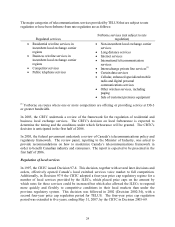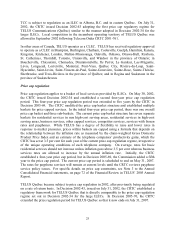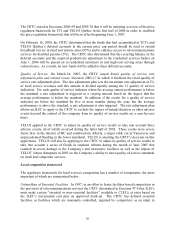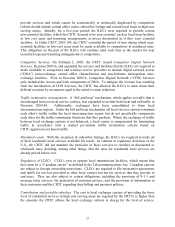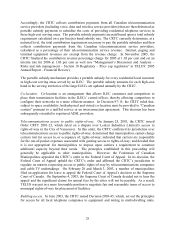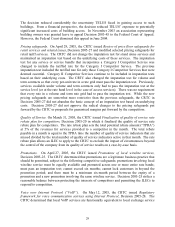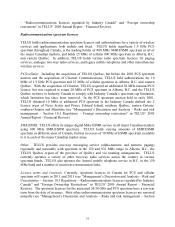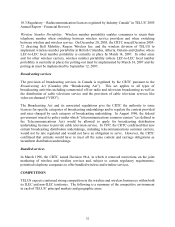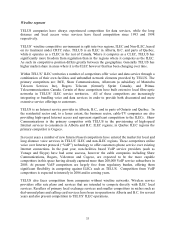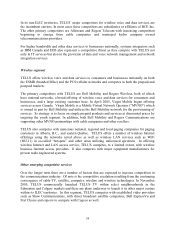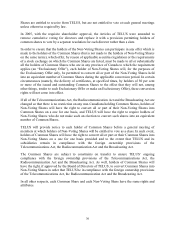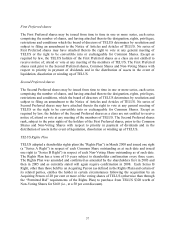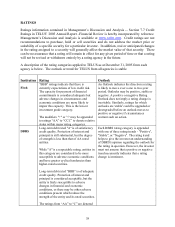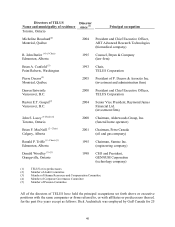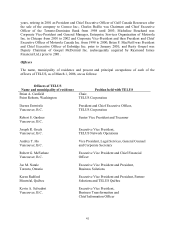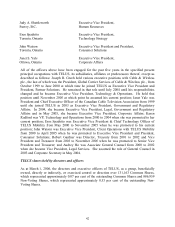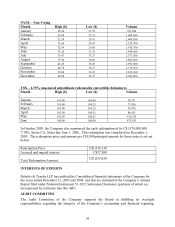Telus 2005 Annual Report Download - page 35
Download and view the complete annual report
Please find page 35 of the 2005 Telus annual report below. You can navigate through the pages in the report by either clicking on the pages listed below, or by using the keyword search tool below to find specific information within the annual report. 34
In its non-ILEC territories, TELUS’ major competitors for wireline voice and data services are
the incumbent carriers. In most cases these competitors are subsidiaries or affiliates of BCE Inc.
The other primary competitors are Allstream and Rogers Telecom with increasing competition
beginning to emerge from cable companies and municipal hydro company owned
telecommunications providers.
For higher bandwidth and other data services to businesses nationally, systems integrators such
as IBM Canada and EDS also represent a competitive threat as they compete with TELUS not
only in IT services but also in the provision of data and voice network management and network
integration services.
Wireless segment
TELUS offers wireless voice and data services to consumers and businesses nationally on both
the ESMR (branded Mike) and the PCS/cellular networks and competes in both the prepaid and
postpaid markets.
The primary competitors with TELUS are Bell Mobility and Rogers Wireless, both of which
have national networks, a broad offering of wireless voice and data services for consumers and
businesses, and a large existing customer base. In April 2005, Virgin Mobile began offering
services across Canada. Virgin Mobile is a Mobile Virtual Network Operator (“MVNO”) which
is owned in part by Bell Mobility and utilizes the Bell Mobility network for the provisioning of
services. Its strategy is to focus on simple prepaid products and services at discounted prices by
targeting the youth segment. In addition, both Bell Mobility and Rogers Communications are
supporting other MVNO partnerships with cable companies and other resellers.
TELUS also competes with numerous national, regional and local-paging companies for paging
customers in Alberta, B.C., and eastern Québec. TELUS offers a number of wireless Internet
offerings using the networks noted above as well as wireless LAN services such as WiFi
(802.11) in so-called “hotspots” and other areas utilizing unlicensed spectrum. In offering
wireless Internet and LAN access service, TELUS competes, to a limited extent, with wireline
business Internet access providers. It also competes with major equipment manufacturers for
private radio engineered systems.
Other emerging competitive services
Over the longer term there are a number of factors that are expected to increase competition in
the communications industry. Of note is the competitive escalation resulting from the continuing
convergence of cable-TV, satellite, computer, wireline and wireless technologies. In November
2005, TELUS commercially launched TELUS TV within select neighbourhoods in the
Edmonton and Calgary markets and there are plans underway to launch it in other major centres
within its ILEC territories. In this segment, TELUS competes with established video providers
such as Shaw Communications, with direct broadcast satellite companies, Bell ExpressVu and
Star Choice and expects to compete with Cogeco as well.


